Top 10 EV Car Brands in July 2024: All You Need to Know
As the electric vehicle (EV) market in India evolves, July 2024 has brought mixed results for the industry, mirroring global trends. According to the latest data from the Federation of Automobile Dealers Associations (FADA), electric car sales in India have experienced a minor decline. Let’s delve into the performance of the top EV car brands in India during this period.
Top 10 EV Car Brands in India – July 2024
Electric Vehicle Sales: A Snapshot
In July 2024, total EV sales in India reached 7,541 units, slightly down by 2.92% from 7,768 units in July 2023. However, there was a 9.38% increase in sales compared to June 2024’s 6,894 units. Despite these fluctuations, several brands have shown resilience and growth in the competitive EV market.

Tata Motors: Leading the Charge
Tata Motors continues to dominate the Indian electric passenger vehicle segment with a market share of 63%. However, the brand saw a 12.72% decline in year-over-year (YoY) sales, selling 4,775 units in July 2024 compared to 5,471 units a year ago. Tata’s lineup includes popular models like the Nexon, Tiago, Punch, and Tigor.
MG Motors: A Growth Story
MG Motors recorded impressive growth with a 23.04% YoY increase, selling 1,522 units in July 2024. The Comet and ZS EV models have contributed to this success, with prices ranging from Rs 6.99 lakh to Rs 25.44 lakh (ex-showroom). The upcoming MG Windsor EV launch on September 11th is anticipated to further boost sales.

Mahindra: Positive Momentum
Mahindra, with its XUV400, has shown positive sales momentum, achieving a 28.50% YoY increase. The XUV400, priced between Rs 15.49 lakh and Rs 17.69 lakh (ex-showroom), secured a 6.27% market share, reflecting growing consumer interest in Mahindra’s electric offerings.
BYD: Rapid Expansion
BYD has demonstrated remarkable growth with a 188.98% YoY increase, selling 341 units in July 2024. The Atto3, E6, and Seal models, priced from Rs 24.99 lakh to Rs 53 lakh (ex-showroom), highlight BYD’s strong presence in India’s EV market.

Other Notable Performances
- Citroen: The eC3 saw a decline of 30.49% YoY, with 155 units sold. The brand is expanding its lineup with the Citroen C3 Aircross EV soon to debut in India.
- BMW: Despite a 34.58% decline, BMW remains the top luxury EV brand in India, with models like the iX1, i4, iX, and i7.
- Hyundai: The Ioniq 5 faced a significant drop of 52.59% YoY, with plans for more India-specific EV developments in the pipeline.
- Volvo: Achieved a 14.29% YoY growth, selling 40 units with models like the XC40 and C40.
- Mercedes: A decline of 18.92% YoY to 30 units was recorded, though the recent addition of the EQA and EQB models may drive future growth.
- Audi: Reported an 88.89% YoY improvement, selling 17 units.
- Kia: Experienced a decline of 44.83%, selling 16 units of the EV6.

Conclusion: Navigating the EV Market Dynamics
The EV market in India is witnessing dynamic shifts, with some brands capitalizing on growth opportunities while others face challenges. As the landscape continues to evolve, manufacturers are adapting by expanding their portfolios and enhancing their offerings to capture a larger share of the burgeoning electric vehicle market in India.


